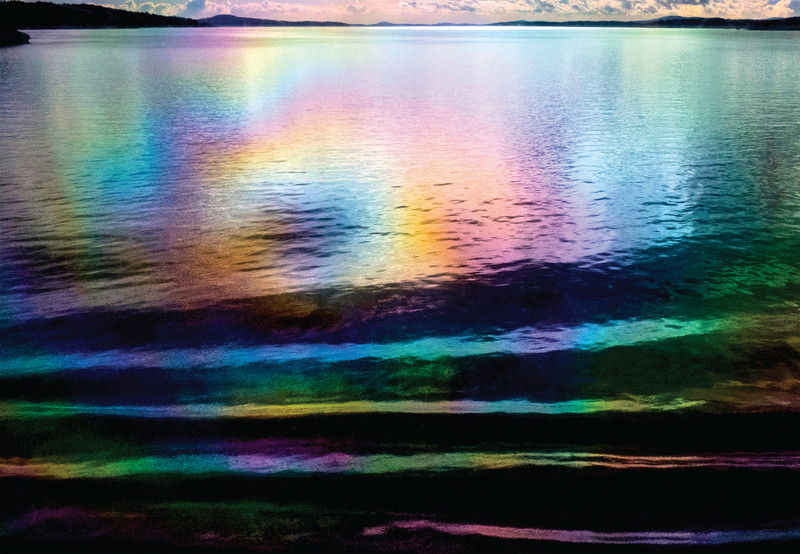
Examining nature symbolism, territorial resistance, and solidarity economies connected to land and water, two solo exhibitions by women artists trace the contours of embodiment and the agency of more-than-human worlds. Calgary-based Miruna Dragan’s When Either But Not Both Are True explores the limits of human comprehension alongside material manifestations of the unknown, the underground, and the under-worldly. Exploring dreaming, divination, energy economies, and logic systems, the project engages human relationships with the natural world in order to question our interactions with the physical spaces we inhabit. Those at the Great River-Mouth is based on Colombian artist Carolina Caycedo’s investigation of hydroelectric sites across Latin America, whose processes of land expropriation and environmental licensing have been marked by unprecedented environmental disasters and profound Indigenous resistance. Picturing water’s living and life-giving capacities, Caycedo’s work affirms nature’s vibrancy beyond the narrow resource-driven logics of extractivism.
How to Order
To order any of our publications, please send an email including title(s), number of copies, and your mailing address to: blackwood.gallery[at]utoronto.ca.
A 20% discount is available to students and members of the Ontario Association of Art Galleries.
- Contributors
- Macarena Gómez-Barris
- Natasha Chaykowski
Her work addresses artful living and survivance in spaces of social and ecological suffering and include her book The Extractive Zone: Social Ecologies and Decolonial Perspectives. In it, she theorizes decolonization in relation to five extractive scenes of ruinous capitalism upon Indigenous territories (Duke University Press, 2017). She is also author of Beyond the Pink Tide: Art and Political Undercurrents in the Américas (UC Press, August 2018) that thinks from submerged perspectives and art-making, social movements, and creative intellectual labor to imagine worlds anew. Her first book Where Memory Dwells: Culture and State Violence in Chile (UC Press, 2009) traces fascism, the rise of neoliberalism, and memory’s obliteration as central to the nation-state. She shows how memorials, painting, and documentary film production are central to enlivening potential in the ruins of necro-capital. Her co-edited volume with Herman Gray of Toward a Sociology of a Trace (University of Minnesota Press, 2010) addresses global sites of deep cultural imprint, and the invisible work of tethering lives of sustenance after catastrophe. Macarena is working on a new book, At the Sea’s Edge (Duke University Press) that considers the fluidity of colonial transits and the generative space between land and sea.
Macarena is Timothy C. Forbes and Anne S. Harrison University Professor, and Chair of the Department of Modern Culture and Media, as well as faculty member in the Brown Arts Institute.
- Artists
- Miruna Dragan
- Carolina Caycedo
- Curator
- Christine Shaw
Shaw’s work convenes, enables, and amplifies the transdisciplinary thinking necessary for understanding our current multi-scalar historical moment and co-creating the literacies, skills, and sensibilities required to adapt to the various socio-technical transformations of our contemporary society. She has applied her commitment to compositional strategies, epistemic disobedience, and social ecologies to multi-year curatorial projects including Take Care (2016–2019), an exhibition-led inquiry into care, exploring its heterogeneous and contested meanings, practices, and sites, as well as the political, economic, and technological forces currently shaping care; The Work of Wind: Air, Land, Sea (2015–2023), a variegated series of curatorial and editorial instantiations of the Beaufort Scale of Wind Force exploring the relentless legacies of colonialism and capital excess that undergird contemporary politics of sustainability and climate justice; and OPERA-19: An Assembly Sustaining Dreams of the Otherwise (2021–2029), a decentralized polyvocal drama in four acts taking up asymmetrical planetary crisis, differential citizenship, affective planetary attention disorder, and a strategic composition of worlds. She is the founding editor of The Society for the Diffusion of Useful Knowledge (Blackwood, 2018–ongoing), and co-editor of The Work of Wind: Land (Berlin: K. Verlag, 2018) and The Work of Wind: Sea (Berlin: K. Verlag, 2023).
Matthew Hoffman
This exhibition is presented in conjunction with The Work of Wind: Air, Land, Sea, a year-long project series that aims to foster a deeper public awareness of the complex entanglements of ecologies of excess, environmental legacies of colonialism, the financialization of nature, contemporary catastrophism, politics of sustainability, climate justice, and resilience. It sets out to develop durable visual-cultural literacies and invites publics to create new encounters in the common struggle for a future.

When Either But Not Both Are True / Those at the Great River-Mouth
Micropublication produced on the occasion of When Either But Not Both Are True and Those at the Great River-Mouth, September 6–December 1, 2018, in conjunction with The Work of Wind: Air, Land, Sea. Curated by Christine Shaw.
Featuring commissioned essays by Natasha Chaykowski and Macarena Gómez-Barris, exhibition information, biographies, and full colour illustrations throughout.
Free

The Blackwood
University of Toronto Mississauga
3359 Mississauga Road
Mississauga, ON L5L 1C6
[email protected]
(905) 828-3789
The galleries are currently open. Hours of operation: Monday–Saturday, 12–5pm, Wednesdays until 8pm.
Facebook | Twitter | Instagram
Sign up to receive our newsletter.
The Blackwood is situated on the Territory of the Mississaugas of the Credit, Seneca, and Huron-Wendat.